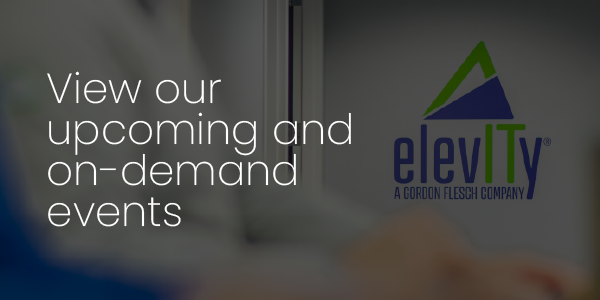One of the greatest concerns of many smaller businesses these days is not necessarily how they’ll keep up with the competition, but how they’ll keep up with technology. Rapid advances in cloud computing and the integration of apps, software and mobile technology are leaving many small- to medium-sized businesses (SMBs) scrambling to upgrade existing systems or determine if they need new ones — all while trying to keep their data secure.
Many SMBs, however, lack the in-house expertise to stay on top of updates and security measures, let alone explore the latest trends in computing that can improve efficiencies and their ROI.
Managed IT Services can alleviate these pain points and give any business world-class technology and access to IT experts that are available 24/7. Chances are you know you need it, but have lots of questions. We’ll address the top five frequently asked questions we get asked to help you determine the right Managed IT solution for you.
1. Is My Business Too Small for Managed IT Services?
When an SMB owner learns that a Managed IT provider has a help desk of 200 technical experts and operates in multiple regions, he or she often feels like their organization is too small. “We’re just 10 people, we don’t need that scale of technology or support.” Contrary to this notion, most Managed IT providers focus on smaller and medium-sized businesses precisely because they’re the ones that usually don’t have dedicated resources or IT leadership.
Businesses with limited IT resources usually can’t afford a dedicated IT expert and, therefore, don’t have someone who is there to solve problems, do upgrades, manage security risks or explore new and available technology and how it might impact their operations.
All businesses — no matter their size — are being disrupted by mobility, cloud computing, social media or big data, and it’s imperative to understand the technology landscape they’re participating in to overcome the challenges they face. With the help of Managed IT, they can tackle those challenges head on.
2. How Can Managed IT Help Keep Our Data Secure?
Many organizations think of security as a firewall located in a back room, but a different mindset is required when it comes to online applications, servers and network security. While isolating data assets from the outside world to keep it safe is important, an equal emphasis needs to be placed on keeping users and systems safe from ransomware and internal threats.
Managed IT takes a proactive approach by providing training and onboarding for employees to establish best practices up front, and ensures that the latest security patches and updates are performed in a timely manner. Most updates can be performed automatically and remotely during off-hours, meaning employees will likely never experience a disruption.
3. Can Managed IT Help Back Up My Systems and Protect My Servers?
Having a disaster recovery plan is critical in today’s digital age. More importantly is having a disaster recovery plan that actually works.
A Managed IT provider will have a two-phased approach. They’ll provide a traditional service that backs up data, often hourly, using proven protection methodologies. If your server goes down for some reason, your data can be recovered and restored within hours rather than days or weeks. The traditional approach should serve as more of a safety net, however, and shouldn’t be called upon if the second approach of proactively addressing issues before they occur is adopted.
The proactive approach ensures that systems are healthy and monitors metrics to identify any problems before they occur or before a safety net needs to be engaged. The combination of proactive tools and the ability to restore data are important elements of any effective disaster recovery plan.
4. What Factors Impact Cost?
A Managed IT provider like the Gordon Flesch Company offers a fixed cost program, allowing businesses to know how much they’ll be spending each month and allows them to accurately forecast expenses. Those costs are determined by the number of devices being supported — computers, servers, software, etc.
It also takes into account the types of services needed such as mobile device management, establishing a disaster recovery program, any tailored design programs, cloud solutions or Hardware as a Service (HaaS). HaaS can leverage resources and help clients think about technology more strategically. Instead of thinking of technology as merely utilitarian — hardware, repairs, etc. — it takes the burden of associated services such as licensing, life cycle management and more off the organization. It’s a beginning to end approach.
5. How Do I Choose the Best Managed IT Services Provider?
You’ll naturally want to enlist the help of a company with a good reputation that offers a 24/7/365 help desk, an operations center and systems monitoring, but there’s more to it than that. While many of the services and management of your technology can take place remotely, there’s no substitute for having a local presence. Often, however, smaller IT companies can’t provide the highest level of service or latest technology, and some large-scale enterprises that do have the resources aren’t available when you need them.
A good provider will not just establish a program and offer a help desk; it will give you resources and people to help you strategically plan your next steps in business and develop a long-term relationship. Seek out a company that provides a dedicated person who fills the role of a CIO without the salary cost. A virtual CIO (vCIO) takes a consultative approach with customers to develop a technology roadmap and follows up quarterly to ensure things are going smoothly and continuously assesses needs. They should not only have technical expertise, but have experience in how to strategically align your technology needs with your business goals.
To understand the process of implementing a Managed IT program, view our Roadmap for Implementing Managed IT infographic by clicking the link below. If you’re ready to explore your Managed IT options, reach out to us here at Gordon Flesch for a no-obligation consultation. We don’t just provide the products and services you need; we provide the relationships you deserve.









%20cropped.webp)




